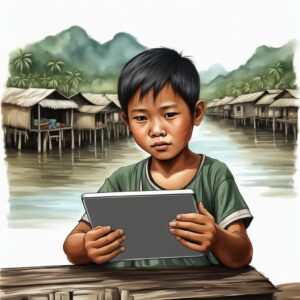Helping Hands Education: Addressing the Plight of Children and Stateless People

Welcome to this ‘Helping Hands Education’ presentation on poverty in Sabah, Malaysia, with a particular focus on improving the lives of children and the stateless population.
Sabah, located on the island of Borneo, experiences significant challenges regarding poverty due to historical marginalization, geographic limitations, and limited economic opportunities.
Causes of Poverty in Sabah:
Poverty in Sabah stems from various factors. Economic issues, such as unemployment and low wages, contribute to the persistence of poverty. Limited access to quality education hinders human capital development and restricts employment opportunities for future generations. Insufficient social support programs and inadequate healthcare services primarily affect vulnerable populations, further perpetuating the poverty cycle.
Consequences of Poverty:
The consequences of poverty in Sabah are far-reaching. Children are particularly affected, with limited access to quality education, leading to decreased opportunities in life. Inadequate nutrition and healthcare services negatively impact their physical and cognitive development, compromising their future well-being and potential. Stateless people in Sabah face numerous legal and social challenges, including limited access to social services, education, and healthcare, further exacerbating their marginalized status.
Improving the Lives of Children:
Improving the lives of children in Sabah requires a multi-faceted approach. Firstly, prioritizing education is crucial. Ensuring access to quality education, especially in rural areas, providing scholarships and incentives for marginalized children, and enhancing vocational training programs can equip them with necessary skills for better employment prospects.
Additionally, healthcare services should be strengthened, focusing on preventive care, access to clean water, sanitation, and nutrition programs. Collaborative efforts with NGOs, community leaders, and healthcare professionals can help provide comprehensive healthcare services to impoverished areas.
To address social welfare, Sabah needs to increase outreach programs for vulnerable children, including those affected by poverty and statelessness. Social safety nets, such as cash transfer programs and community-based initiatives, can provide immediate relief and support to families in need. Promoting community involvement and volunteer networks can also enhance social support.

Addressing Statelessness:
Addressing statelessness in Sabah requires legal and policy reforms coupled with comprehensive support for affected individuals. Establishing clear and accessible pathways to citizenship can ensure the inclusion of stateless people in society, granting them access to education, healthcare, and other social services. Regularization programs should be implemented to recognize their rights and provide documentation, granting essential legal protections.
Improving the legal framework is crucial as well. Advocacy for legal reforms and awareness campaigns can address issues surrounding statelessness, highlighting the importance of legal recognition and protection for stateless individuals.
Collaborating with international organizations and neighboring countries can support efforts to find long-term solutions for statelessness in Sabah.
Conclusion:
In conclusion, poverty remains a significant challenge in Sabah, Malaysia. Improving the lives of children and stateless individuals requires a comprehensive approach encompassing education, healthcare, and social support. Prioritizing quality education, enhancing healthcare services, and strengthening social welfare programs can create a more inclusive and equitable society.
Addressing statelessness through legal and policy reforms is also essential to ensure the rights and well-being of all individuals in Sabah.
Through these collective efforts, Sabah can pave the way towards a brighter and more prosperous future for its citizens.
 The future
The future
Today we are starting with gathering resources to equip the children, and providing one important subject to kick it off.
That is why we started our ‘Helping Hands Education’ project, to not only provide basic equipment that allows children in economically challenging situations to have access to quality English instructors, but also the ability to sit real exams and gain qualifications in the language.
*We will work on providing Class ‘Android Computer Tablets’ for economically challenged communities to build an ‘Online school’ computer classroom.
*We will help establish a fit for purpose internet connection.
*Each partner group will have a program coordinator in the community we can work along side.
*Our teachers will be experienced teachers from around the world.
*This program will also pay teacher’s work output and provide funds to source very friendly and effective teachers.
*We can give young people a new reason to be excited about the future.
*Expansion into a variety of relevant subjects that need to be taught.
With your help we would expand to other subjects and provide assistance to youth to have access to high quality education.


